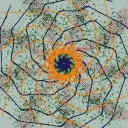Same as Windows 9
jorge
- 2 Posts
- 49 Comments

 1·10 months ago
1·10 months agoI have a few ideas

 27·1 year ago
27·1 year agowith a white circle and a black cross

 8·1 year ago
8·1 year agoWhat is the ratio of Stanley Nickels to XBucks?

 1·1 year ago
1·1 year agoVery back-of-envelop calculation:
The quantum scale is characterized by an action comparable to the Planck constant, hbar=6.6x10-16 eV s. A quick wikipedia search tells us that the typical electric impulse needs at least 25 mV (from -70 mV in the resting state to -55 mV in the threshold), and lasts around 1 ms, giving an action of 2.5x10-5 eV s, which is 300 billion times larger that the quantum noise.
If your “brain script” leads you to kill, you just need to be removed from society
If you accept strict determinism, the fact that killers should go to prison is one of the “biases formed by prior events” that will determine that most people won’t become killers. Which in turn determine us as individuals in a society to create and enforce justice systems.
Alpine is Linux but not GNU
Hurd is GNU but not Linux

 4·1 year ago
4·1 year agoWow, Facebook is lobbying for a law that eliminates their position of monopoly and makes it easier for its users to migrate to other apps. Zuck must be playing some 4D chess.
That, or maybe Facebook has been lobbying AGAINST this law, and your comments in this thread are just fearmongering and conspiracy theories.
It seems that there is an alternative proposal that is more active, this one. It uses “tags” instead of “flairs”, but the idea is essentially the same.
Or, maybe, the 99% is a lie

 6·1 year ago
6·1 year agoSo it would be a breakdown of standard gravity, not of gravity full stop. Sensationalized headline.

 2·1 year ago
2·1 year agoOzymandias, is it you?
Exactly. The ex-CEO. Emphasis on ex. Mozilla took the right decision, Brave didn’t. That is literally why the “both-sides” argument is ridiculous.
“some dude” is the CEO. Has the CEO of Mozilla donated money against same-sex marriage? If not, you are the one who is engaging in “poo-flinging”.

 1·1 year ago
1·1 year agoThat relies on human brains that are trained. LLMs are not human brains. “Training” them is not the same thing as teaching humans about something.
Circular reasoning. “LLMs are different from human brains because they are different”.
Also, why did you felt compelled to add the adjective “human”? Don’t you consider that gorillas, dolphins, octopuses or dogs are intelligent, capable of learn new things?
Human brains are way more complicated than just a bunch of weighed correlations.
And that is the problem of your argument. You seem to believe that intelligence is all-or-nothing, that anything that hasn’t a human-level intelligence is not intelligent at all. Of course human brains are more complicated that current LLMs, nobody has ever disputed that. But concluding that they aren’t and will never be intelligent because they aren’t as complicated is a huge non-sequitur.

 2·1 year ago
2·1 year agoIt also matters because that would be a truly amazing, world-changing thing if we could create intelligence out of thin air, some statistics, and a lot of data.
We do it routinely. It is called Education System.
The problem is that the only other mod has been inactive for two years. So I need some intervention from the admins, I guess.

 23·1 year ago
23·1 year agoThey never said that they were walking on a straight line

 3·1 year ago
3·1 year agoThings like asteroids, galactic dust and the like are already accounted for in the baryonic (ie ordinary) matter. We can estimate it for example measuring the absorption of different wavelengths of light, or extrapolating the local abundance of asteroids. There are theories like the MACHO that propose that we are missing some, but in general it is understood they can only account for a tiny fraction of the missing mass.
The predominant hypothesis is that dark matter is composed by some unidentified particles, that have the same thermodynamic properties as usual matter (basically that their energy is proportional to the volume), but that don’t interact (or interact very weakly) with normal matter.


Fedora 39 is clearly superior to Ubuntu 23